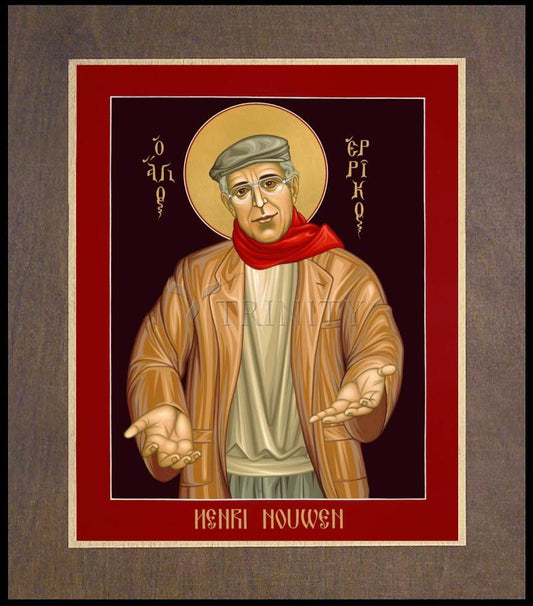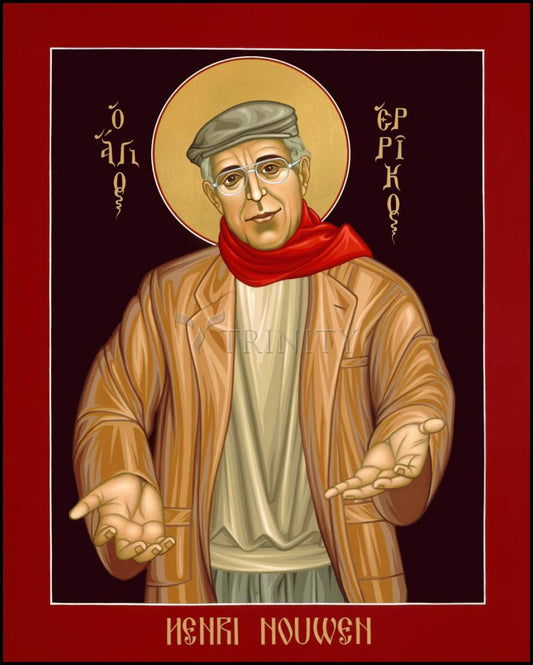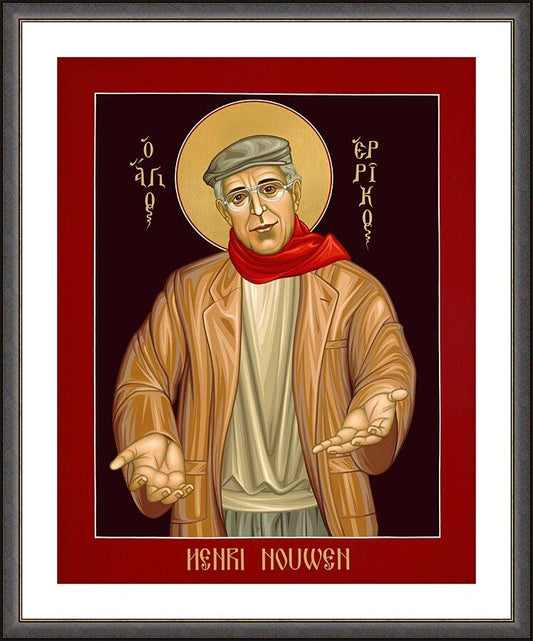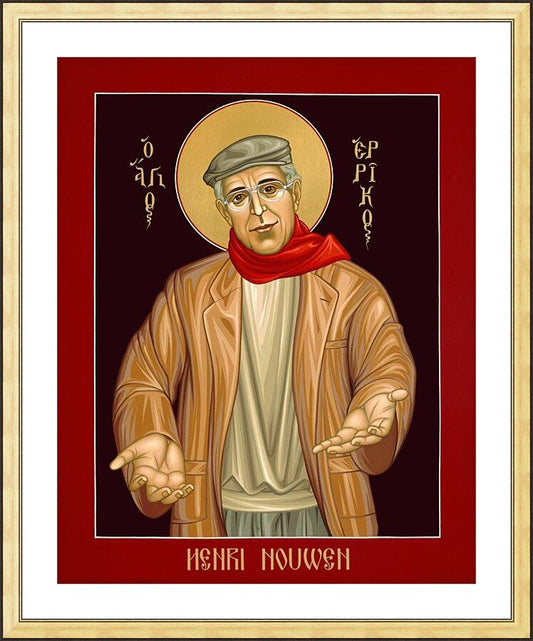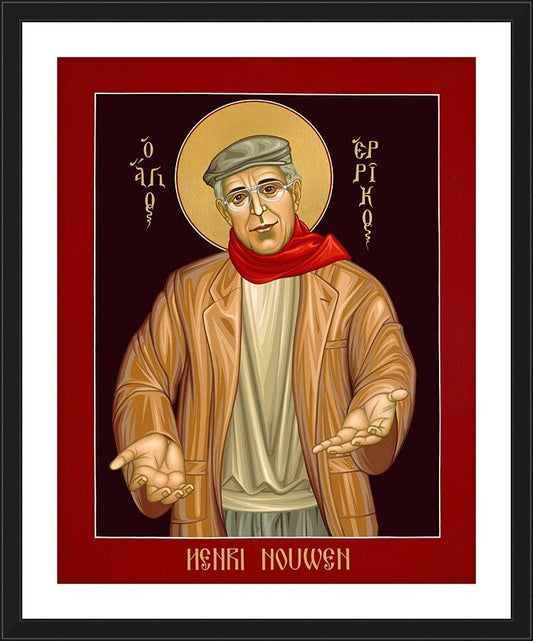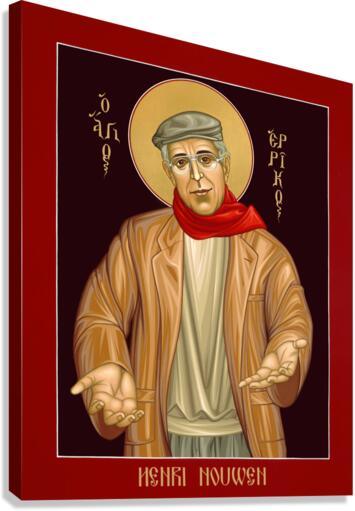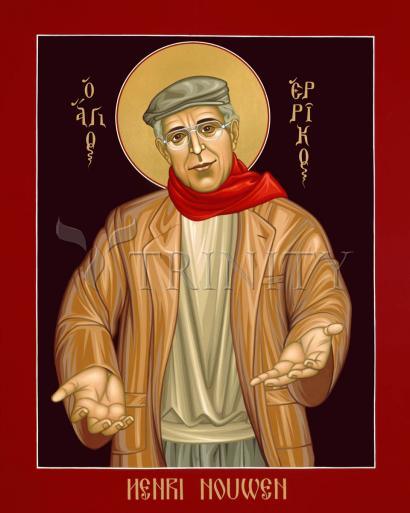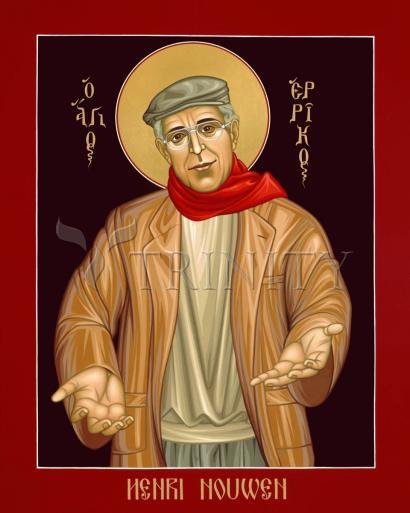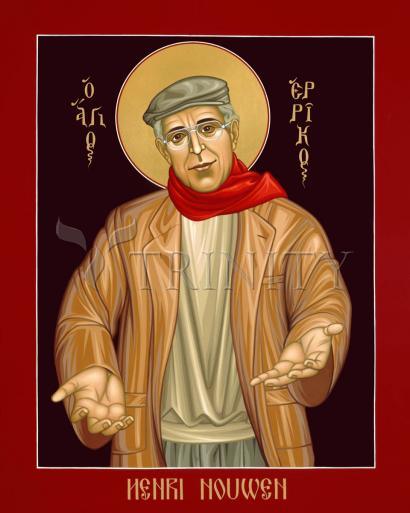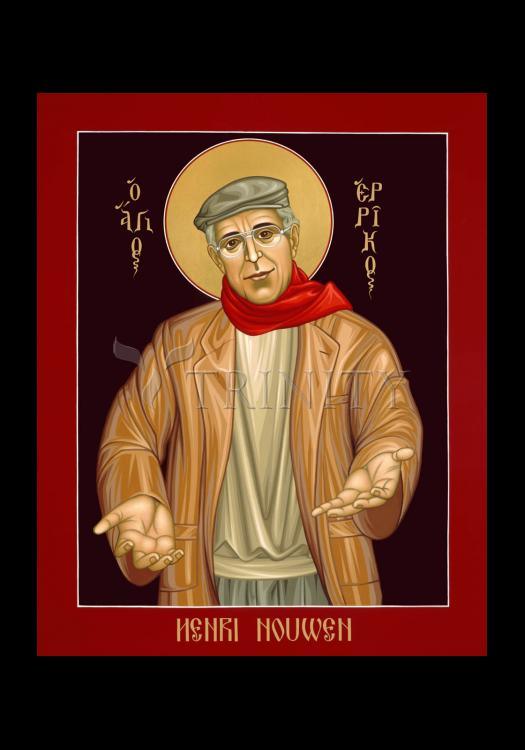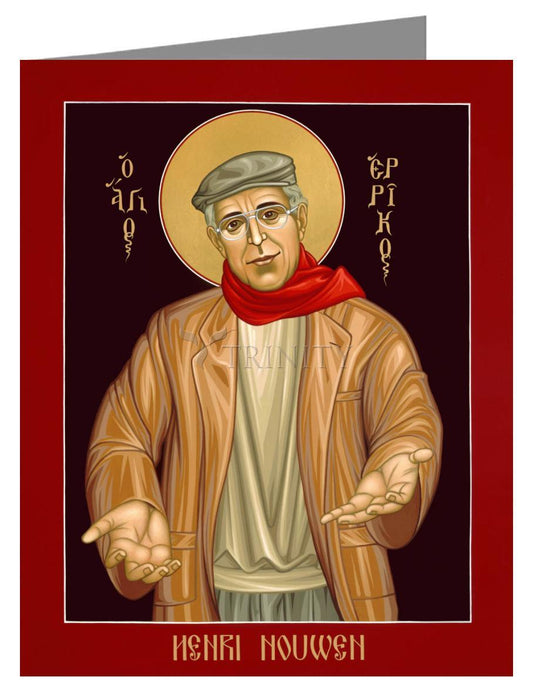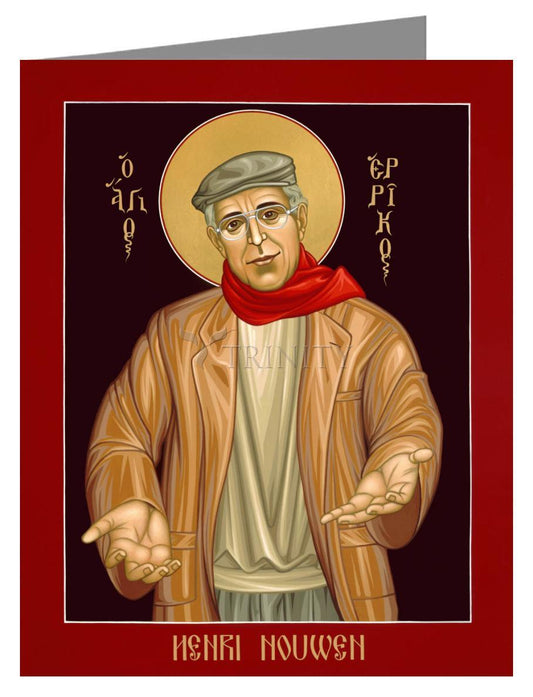HIS FAMILY BACKGROUND
Henri Jozef Machiel Nouwen was born in the Netherlands in Nijkerk on January 24, 1932. Henri's father was one of eleven children and Henri's grandfather, was the town clerk of Venlo at the beginning of the century. His grandmother, on that side of the family, occupied herself with raising the children. They were "salt-of-the-earth" people and they were pious Catholics.
Henri's mother, Maria Huberta Helena Ramselaar (1906- 1978), was one of eight children. They lived in Amersfoort, in the center of the Netherlands. Henri's grandfather on this side of the family died young, and his grandmother took over the family store and built a prosperous 'family' business. She was interested in the arts. They were also Catholic and their eldest son, Antoon (Toon), was a priest and later a prominent monsignor, who influenced his nephew Henri's vocation.
Henri's father, Laurent Jean Marie Nouwen (1903-1997), became known for his expertise in tax law. He worked for the Government as 'Inspector of Registration and Public Property' for sixteen years carrying the title of "Notarial Candidate." During the Second World War he gave up this position for private practice as an advocate at The Hague. He was later named professor of Notarial and Fiscal Law at the Roman Catholic University of Nijmegen. The family lived in Nijkerk, Venlo, Bussum, The Hague, and Nijmegen. Henri's father retired in Geysteren, outlived Henri by one and one half years, and died in 1997 at the age of 94.
Henri's mother, on her own, studied English, Italian, Norwegian, French, Latin, and Greek. She was often called upon to interpret from Italian to Dutch. For many years she was the Supervisor of the Bookkeeping Department in the family business, run first by her mother and later by her brother. Her first child, Henri, was delivered after three days of pain and hardship, and perhaps because of this, a strong bond developed between Henri and his mother. She had three more children. She is fondly remembered as being warm, welcoming, and religious. In 1978 she came to the United States with Henri's father to visit Henri, but she was not feeling well. While there she was diagnosed with cancer. She returned home immediately and died three weeks later. Her sudden death had a big impact on Henri's life.
Two years after Henri's birth, his brother, Paul, was born. Paul studied law and worked in the Insurance Business. He later became prominent in The Netherlands as the President of ANWB, a three million member association for tourism, touring, water sport, and recreation. He married Marina San Giorgi in 1972 who was a teacher. She began to write poetry after being diagnosed with cancer in 1989. She died in 1993. After her death her poetry was published in a book titled, "Een Glimlach Kwam Voorbij" for which Henri wrote the Introduction. Paul and Marina had no children.
Ten years after Paul's birth, another son, (Willem) Laurent (1944), was born into the Nouwen family. Laurent is a lawyer and was partner in the firm Nauta Dutilh at Rotterdam. He married Heiltjen Kronenberg in 1975, a private practitioner and later a judge. They have three children, Sarah, Laura, and Raphael. After Henri's death, Laurent founded the Henri Nouwen Stichting, a foundation to further Henri's works particularly in the Netherlands, to support the Henri Nouwen Literary Centre in Canada, to assist L'Arche, and to promote and support those who are developing a living and viable Christian spirituality for today.
Two years following Laurent's birth a daughter, Laurien was born (1945). Laurien also studied law but graduated in Italian. Laurien married a lawyer, Marc Van Campen, and they had three children, Frederique, Marc and Rainier. Later, she was divorced. Today she is Managing Director of a law firm in Arnhem.
HENRI'S CHILDHOOD
Henri often spoke of his beginnings by describing how he perceived himself as a youngster. He would say, "I grew up in a very protected and safe environment and I learned to know that I was Dutch and I was Catholic. It took me quite a long time to discover that there were people, many people, who were neither!" Living through the Second World War as a child was not to comprehend the depth and the significance of it, but rather to see it as dangerous and exciting. There were times when he, with his father and brother Paul, had to ride on bicycles into the country in search of food for the family. At other times, he helped to hide his father from those who came in search of him for compulsory labor in Germany.
Henri was a good student, energetic and pious. He expressed his desire to become a priest at age 6. At that time his maternal grandmother had a miniature altar built for him, and small-size vestments made for him, so he could 'celebrate' the Eucharist with his siblings and playmates in the attic of their home. Henri liked to be the leader!
When Henri was older he could speak about the two voices that he heard as a child. The voice of his mother praised and affirmed him as he was, and called him to always love Jesus. The voice of his father, proud of his accomplishments, encouraged him and challenged him to do more and become a better and more successful person. Henri commented that he lived the first part of his life listening more to the voice of his father, and the second part of his life listening more to the voice of his mother.
PRIESTHOOD AND FURTHER FORMATION
Henri was educated by the Jesuits at the Aloysius Gymnasium at the Hague. He decided that he would not become a Jesuit priest because it required too much study. After secondary school he took one year in the minor seminary in Apeldoorn where his uncle, Toon, was president. He did six years in the major seminary in Rijsenburg/Driebergen, and was ordained priest for the diocese of Utrecht in 1957 by Archbishop B. Alfrink.
Henri was interested in Pastoral Ministry and he knew that the comparatively new discipline of Psychology was important despite the fact that it was frowned upon in Church circles because it was felt that Psychology undermined faith. Immediately after ordination, Henri requested of his Bishop and was granted further study at the University of Nijmegen in Psychology where he spent six years. While studying he worked as a pastor for a short time in the mines, became a chaplain in the army, and chaplain of the Holland-America Line accompanying immigrants to the United States. He graduated as a Psychologist in 1963.
Upon the advice of Gordon Alport, the famous Psychologist whom he met in New York, Henri took two more years of Psychology at the Menninger Institute in Topeka, Kansas. These years were formative years shaping his thinking and the direction of his life.
THE TEACHING YEARS
Henri accepted an invitation to teach Psychology at Notre Dame University in 1966 and spent two years there. He realized during this time that his deeper interests lay in the realm of Pastoral Theology. Thus he gradually began to develop courses in Pastoral Theology that reflected his knowledge of Psychology. His first two books came out of this period, Intimacy: Pastoral Psychological Essays and Creative Ministry: Beyond Professionalism in Teaching, Preaching, Counseling, Organizing and Celebrating.
In 1968 Henri returned to The Netherlands to teach Psychology but once again recognized his preference for Theology. He engaged in studies for a Master's Degree in Theology and graduated in 1971. These studies confirmed for Henri his passion for educating in the area of pastoral ministry.
When Yale Divinity School approached him with an invitation to teach in 1971, it is said that he laid down the following conditions:
1. There would be no expectation from Yale that he would write a dissertation, or would that be matter of future discussion.
2. Within three years he would receive a permanent appointment (tenure).
3. Within five years he would become a full professor.
4. His writings would not be required to adhere to any outside criteria.
Yale accepted. Henri began teaching in the fall of 1971 and taught there for ten years. He was a popular teacher and he loved his students. He also made many good friends. This period was very fruitful as the material from his classes began to be published. The books during the Yale years were:
With Open Hands
Thomas Merton: Contemplative Critic
The Wounded Healer: Ministry In Contemporary Society
Aging: The Fulfillment of Life Co-authored with Walter Gaffney
Out of Solitude: Three Meditations on the Christian Life
Reaching Out: The Three Movements of the Spiritual Life
Genesee Diary: Report from a Trappist Monastery
The Living Reminder: Service and Prayer in Memory of Jesus Christ.
Clowning in Rome: Reflections on Solitude, Celibacy, Prayer and Contemplation In Memoriam
The Way of the Heart: Desert Spirituality and Contemporary Ministry
Making All Things New: An Invitation to the Spiritual Life
A Cry for Mercy: Prayers from the Genesee
During this time certain experiences impacted his life and work at Yale and beyond:
a) He discovered solitude by twice choosing to spend about seven months, living as a monk, in the Trappist Monastery of the Genesee. He wrote about his experience in "The Genesee Diary".
b) He also did further study and became a fellow at the Ecumenical Institute at Collegeville, Minnesota. This study opened him to men and women of other faiths. He also took five months in Rome as a scholar at the North American College where he published "Clowning in Rome." The solitude and the study profoundly affected his thinking and his future ministry.
c) Henri's mother died during this tenure at Yale. Her loving, caring, concerned, affirming, and challenging voice was silenced. Henri wrote feelingly about this moment, expressing his experience in "In Memoriam" and "A Letter of Consolation."
In the late seventies Henri became interested in all that was happening in Central and South America. He educated himself around the political and theological developments that were causing so much change and suffering for the Poor. He decided to leave Yale in 1981 choosing to go to live in Peru with a view to staying there permanently to live and do ministry with the people there. Although this proved not to be his direction, his visits to the south changed his worldview and his convictions about his own life and vocation. He wrote during this time the book, "Gracias" and "Love in a Fearful Land." This was a time of further evolution and growth.
Harvard invited him to come and teach and again, with conditions, he accepted a part time role to teach three semesters. Meanwhile, he criss-crossed North America on speaking tours about conditions in South America, as a sort of reverse mission with the poor there. This was a painful time because his energies were scattered and he was unable to find himself either as professor at Harvard or as 'missionary' to the South.
THE LAST DECADE: A HOME IN L'ARCHE
A chance meeting with Jean Vanier, the founder of L'Arche, an international movement of communities that welcome people with disabilities, inspired Henri to resign from Harvard and spend a sabbatical year, writing, in Trosly-Breuil, France, in the original community of L'Arche where Jean Vanier lived. He felt at home there and in 1986 accepted an invitation to become pastor for the L'Arche community of Daybreak in Toronto, Canada. This year of transition is the subject of his book, "The Road to Daybreak."
Daybreak was his home-coming. He was welcomed into one of the homes to live with the men and women with a disability and he was asked to help Adam Arnett, a severely disabled man, with his morning routine. In Henri's book "Adam, God's Beloved," written shortly before he died, he describes how Adam became his friend, his teacher, and his guide.
A year after arriving in Daybreak Henri suffered a severe depression. He left the community for seven months of solitude, guidance, and recovery. During this time he wrote his classic book, "The Return of the Prodigal Son". He later published "The Inner Voice of Love" which were spiritual imperatives that he wrote to himself during this dark and suffering time away.
His return marked perhaps, the beginning of his deepest fulfillment as priest, friend, author, lecturer, and mentor. He gave countless lectures, welcomed hundreds of people for counsel, and wrote many books during this period. Whenever he traveled or lectured, he invited one of the core members (persons with a disability) to accompany him and to speak with him. His contribution to the spirituality of L'Arche was profound as he was able to creatively interpret the Beatitudes, and especially, "Blessed are the Poor", in a way that touched the hearts of those within and beyond the boundaries of L'Arche.
In 1995 Henri was sent by the people of Daybreak on a year's sabbatical for writing. During this time he wrote five books and the last of these to be published is his "Sabbatical Journey" which describes the year.
Three weeks after his return from his sabbatical, enroute to Russia to do a TV documentary about Rembrandt's painting of the Prodigal Son, Henri suffered a heart attack in The Netherlands, his homeland. His ninety-three year old father and his siblings visited him and cared for him in the hospital in Hilversum. He began to recover and the whole thing did not seem so serious. Unfortunately, still in the hospital and after less than a week he suddenly suffered a second, fatal, heart attack in the early morning of Saturday the 21st of September 1996.
There were two funeral services, one in Utrecht, The Netherlands, where Cardinal Simonis presided, and the other in Toronto, Canada, with the participation of the community of Daybreak. Henri is buried in King City, close to Daybreak, in Richmond Hill, Ontario.
Below is an article, written by a Daybreak Community member, Dr. Carolyn Whitney-Brown, and published in a major Canadian national newspaper the Globe and Mail shortly after Henri's death. It, more than anything written so far, captures the personality and the spirit of a beloved son and brother, a faithful colleague and friend, and a pastor par excellence.
Excerpts from Literary Executrix of the Henri Nouwen Literary Centre by Sue Mosteller, CSJ
Lives Lived: HENRI J. M. NOUWEN
When Henri Nouwen was newly ordained in 1957, his fellow psychology students at the University of Nijmegen thought initially that he wanted to cultivate important people. "We misunderstood," recalls one. "We didn't notice that he was as interested in the janitor or groundskeeper as he was in the important people we were watching."
Nearly 40 years later, this was still Henri Nouwen: eager to cultivate people of all kinds -- to help them take root and grow. The celebrated and much translated author of more than 30 books, including The Wounded Healer and Our Greatest Gift, he taught at Harvard, Notre Dame and Yale, and was in demand around the world as a speaker and teacher Henri was never a cloistered academic. Even so, his move in 1986 to the L'Arche Daybreak community in Toronto was remarkably courageous. L'Arche is an international network of communities founded by a Canadian, Jean Vanier, where people with developmental disabilities and their friends live together.
Many members of L'Arche do not read, and Henri's restless spirit wanted a home where his reputation would mean nothing. He found it: Everyone at Daybreak was interested in a brilliant 55-year-old priest who was unable to make a sandwich; who totaled a new car driving it away from the dealership; who spoke with his giant hands flailing and his whole gangly body quivering with his desire to communicate; whose Dutch accent could offer a whole meditation on "face" and only halfway in would we realize that he was speaking of faith; who might in a single week be giving talks on three continents; whose friends came hitch-hiking and in private planes; who willingly shared details of his life in his 30-some books that most of us would cringe to admit, much less publish!
Just as Daybreak loved Henri, he grew to love Daybreak. He developed a deep friendship with Adam Arnett (1961-1996), a man who never spoke a word, who taught Henri to slow down (briefly!), to be physically present, and to trust love that could grow without words. Henri rarely accepted a speaking engagement without taking a member of the community to speak with him. "People won't remember a word I said," he reflected, "but they'll remember that Bill van Buren and I stood here as friends and equals and spoke together."
A few years ago, bishops and representatives from various churches were invited to L'Arche for a formal affirmation of Henri. Observing that Henri brought much mirth to the community, Jean Vanier suddenly decided that we would do Henri-skits. For this distinguished audience, we imitated his frenzied work habits, his vast correspondence and his passion to communicate God's unconditional love and acceptance of every person.
We laughed uproariously over all the eccentricities that made Henri so hard to live with, and all the generosity of spirit that made him such a delight to know. At the end of the evening Henri said with great emotion: "I didn't know you knew me so well!"
Henri believed that we are each totally beloved by God -- and yet he couldn't quite trust totally that he was beloved, truly at home. So the gift and struggle of his life remained intertwined -- the struggle of his own chaotic emotional life, his insecurity and fear generating the gift of an enormous understanding and compassion for every other human being. We joked that Henri wrote the same book over and over, and that's true, because he wanted so deeply to communicate a message of love and home that he both could and couldn't believe. So he wrote it again and again as he ongoingly glimpsed it and lost it, always finding new images -- bread broken and shared, an empty church, open hands, clowning, circuses, mirrors, dancing, homecoming.
One of Henri's deepest achievements, and the spur behind his writing and teaching, was to trust that the truth of his often difficult life would help others. In 1993 he wrote, "Our death may be the end of our success, our productivity, our fame or our importance among people, but it is not the end of our fruitfulness. In fact, the opposite it true..."
His funeral in Canada gathered over a thousand people of many races, faiths, economic levels, some leading intellectuals and some labeled mentally handicapped, his family from Holland and the children of L'Arche Daybreak, peace activists, military chaplains, dancers in wheelchairs, all people grateful to celebrate and continue Henri's life.
—Excerpts from a story in the Globe and Mail by Carolyn Whitney-Brown, Ph.D.



